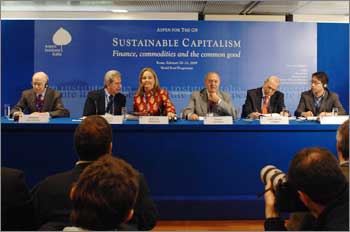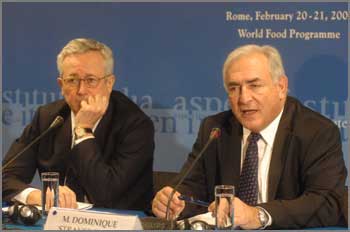News

Rome, February 20-21, 2009
The participants at this International Conference observed that it was on the basis of these assessments that urgent measures and policies for the future need to be discussed, taking two needs in particular into account: that of restoring an ethical dimension to capitalism (which, among other things, is essential in order to restore confidence in the entire economic system), and that of curbing protectionist temptations (which would certainly have the effect of worsening the crisis). Both these needs must be addressed through a kind of “global new deal” which enables responsibilities to be shared and some of the rules of the game to be rewritten. It remains unclear how much of the present system can be retained. Put another way, it is uncertain whether we are experiencing an exceptional phase in the evolution of the markets or some sort of terminal crisis of a certain phase of capitalism, due to the spread of new technologies, the emergence of new players and planetary sustainability constraints.

It is also not clear whether the plans of the Obama administration will have the desired effects. According to some participants, the American President is making too many announcements in too many areas when he should be concentrating on the crisis in the banking sector. As far as Europe is concerned, the risk is that national approaches to the crisis will end up damaging the single market, the true binding factor of the EU. In terms of China and the new economies in general, the theory of “de-coupling” (that is, the capacity of these economies to remain immune from the contagion) has turned out to be entirely unfounded, whilst the slowdown in growth rates is creating evident problems of social sustainability (and hence of political instability).
Looking at the relationship between energy security and environmental issues, the participants pointed to the underlying problem as being one of investment, even more so in a recessionary phase marked by major difficulties in the credit sector. Massive investment is also essential in order to enable long-lasting recovery, in addition to favoring a qualitative leap in terms of technological innovation, efficiency and, hence, environmental sustainability. The diversification of already available energy supply sources remains an important factor, but the primary goal is still that of moving towards a diverse energy mix and, in many respects, a diverse production system. Any environmental impact reduction scheme will need to avoid punitive solutions for growth sectors, in part because it will otherwise not garner the necessary consensus in the major emerging countries.
In looking towards a market system that is truly sustainable and adaptable to the challenges of the coming decades, less dynamic regions or at any rate those most affected by poverty cannot be overlooked. In these regions, the global recession is turning into a real food crisis. Price trends for certain crucial products are not the only problem, given that the current prospect is also one of reduced development aid and further protectionist tensions in the agricultural sector. In such circumstances, there is also a risk of reversing the significant progress made in recent years in terms of economic growth and capacity to attract international investment, especially on the African continent – difficult processes which, in turn, are a precondition for poverty reduction.
The issue of establishing a new and more effective global governance system is closely bound up with decisions that will in any case need to be taken by the major national players, both because certain key stimuli (such as tax relief) remain within the national jurisdiction, and because the responsibility for introducing corrective measures and new approaches mainly falls to certain countries. In this regard, the G-8 and, now, also the G-20 are the natural forums in which to step up the level of coordination and avoid counterproductive actions. Indeed, the seriousness of the crisis calls for decisive concerted action in various forums which is laboriously beginning to get underway at the European but also the transatlantic level, and in less institutionalized forms in other regional groupings. In the final analysis, however, the participants acknowledged that for any “new deal” to be effective it must be global in scope and include new monetary and trade agreements.





